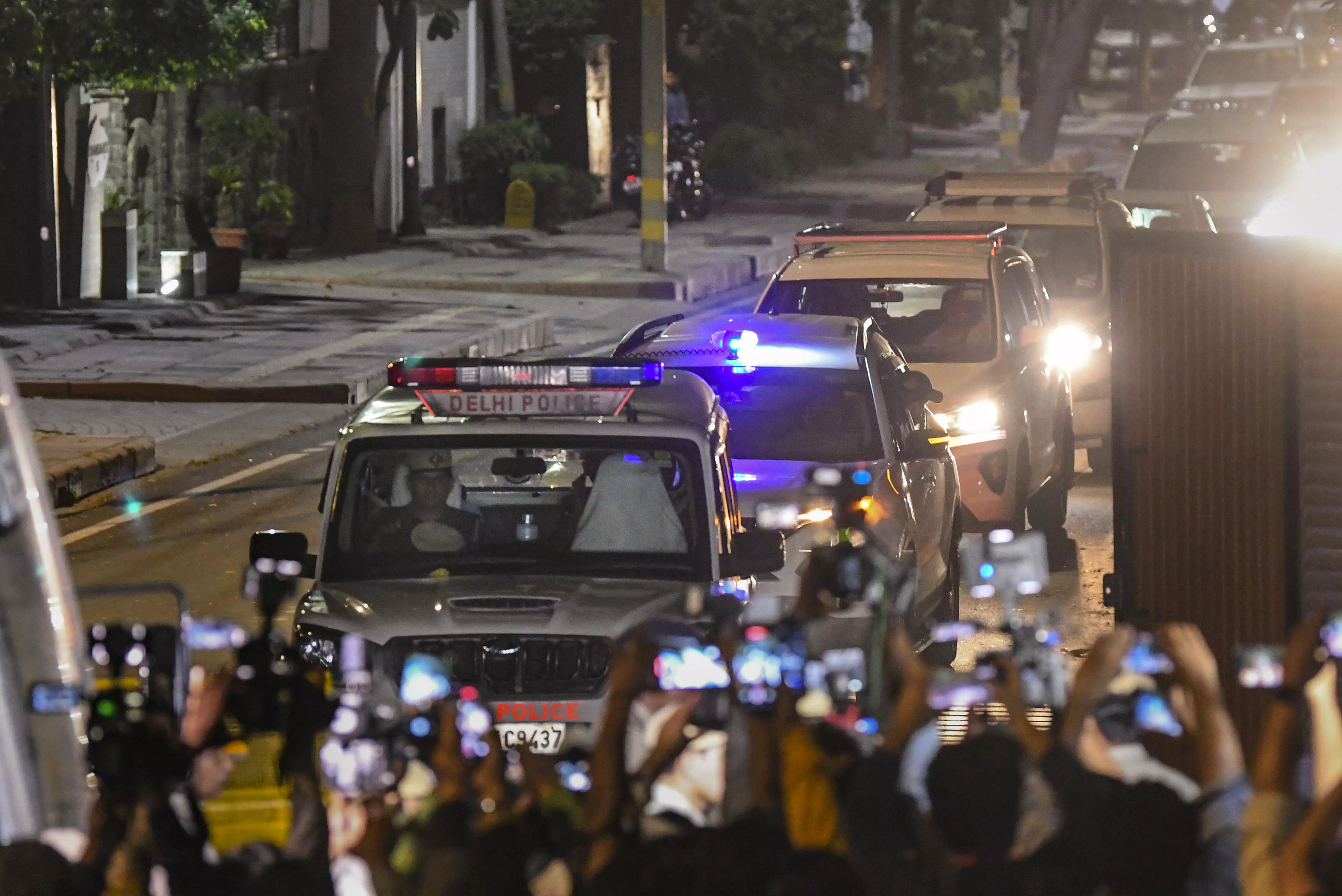
Delhi CM Arvind Kejriwal being taken by the Enforcement Directorate (ED) officials after he was arrested in Delhi excise policy case on Thursday night, March 21. PTI
Delhi excise policy 'scam': How and when it began, who got arrested, case so far
The Enforcement Directorate has alleged that AAP leaders received kickbacks worth ₹100 crore as a result of the liquor excise policy

Delhi Chief Minister Arvind Kejriwal wasarrested by the Enforcement Directorate (ED) on Thursday night (March 21) in the money-laundering case linked to the Delhi liquor excise policy. The ED arrested him hours after a division bench of the Delhi High Court refused to grant him interim protection against arrest in the case.
The Aam Aadmi Party (AAP) approached the Supreme Court for an urgent hearing immediately after his arrest, but the apex court refused to grant a midnight hearing.
Kejriwal’s petition against the ED arrest was mentioned before the Chief Justice of India CJI DY Chandrachud at 10.30 am on Friday (March 22), who assigned it to a bench headed by Justice Sanjiv Khanna. Justice Khanna told senior advocate Abhishek Manu Singhvi that a three-judge bench would hear the case later on Friday.
What is the Delhi liquor excise policy case?
The Delhi AAP government implemented a new liquor excise policy for 2021-22 in November 2021. The Delhi chief secretary in a report in July 2022 alleged that the policy violated several rules. The Delhi Lieutenant Governor recommended a CBI probe into the case, which filed an FIR in August 2022. Taking cognisance of CBI’s FIR, the Enforcement Directorate filed a money laundering case in August 2022.
The ED alleges that AAP leaders received kickbacks worth ₹100 crores as a result of the liquor excise policy. It claimed that political leaders including Arvind Kejriwal, Manish Sisodia, K Kavitha, and others hatched a conspiracy in the excise policy. It has alleged that a South Group made up of Magunta Srinivasulu Reddy, Sarath Reddy, and K Kavitha were allotted 9 zones out of 32 in Delhi under the policy. The agency said the profit margin for wholesalers was 12 per cent, and 185 per cent for retailers, and that 6 per cent was supposed to be collected back from the wholesalers by the AAP leaders.
Timeline
November 2021: The Delhi government implemented the new liquor excise policy.
July 8, 2022: The Delhi chief secretary filed a report that the new liquor excise policy that was formulated for 2021-22 was found to have prima facie violations of the GNCTD Act 1991, Transaction of Business Rules 1993, Delhi Excise Act 2009, and Delhi Excise Rules 2010.
July 2, 2022: Delhi Lieutenant Governor recommends CBI probe into violation of rules.
August 2022: The Central Bureau of Investigation (CBI) registered a First Information Report (FIR) on the recommendation of the Delhi Lieutenant Governor, based on the chief secretary’s report.
August 19, 2022: CBI raided the houses of then Deputy Chief Minister of Delhi Manish Sisodia and three other persons.
August 22, 2022: The Enforcement Directorate took cognisance of the FIR filed by the CBI and filed a money laundering case.
September 2022: CBI arrested Vijay Nair, AAP’s communications head
November 2022: ED’s first chargesheet
The ED filed its chargesheet in the case before a court in New Delhi in the last week of November 2022 and named a liquor businessman Sameer Mahendru, the promoter of Indospirits, as one of the accused. The prosecution complaint also listed two other persons and was about 3,000 pages. Five people, including Mahendru, were arrested by the ED after questioning.
March 2023: ED arrested Manish Sisodia, Delhi’s Deputy Chief Minister
August 2023: ED’s second chargesheet
The ED filed its second chargesheet in the case on August 1, 2023, in which it named a total of 12 accused, of which 5 people had already been arrested. The chargesheet mentioned 7 companies as accused in the case.
October 2023: ED arrested AAP leader Sanjay Singh
October 2023: ED sent its first summons to Delhi Chief Minister Arvind Kejriwal
Between November 2023 and January 2024: ED sent three more summonses to Arvind Kejriwal.
January 2024: Kejriwal asked the ED why notices were sent to him if he wasn’t an accused in the case.
February 2024: After its fifth summons was ignored by Kejriwal, ED moved the court alleging that the CM was not complying with its summons.
Delhi court grants the Delhi chief minister exemption from personal appearance for the day.
February 2024: Kejriwal skipped ED’s seventh summons. AAP claimed that they had raised legal questions on ED’s “illegal summons” and had not received any response from the agency.
March 2024: A sessions court granted bail to Kejriwal on two complaints filed by ED for not responding to their summonses.
March 2024: Kejriwal moved the Delhi High Court against ED’s summonses, saying there was a “clear intent” to arrest him with the dates for the Lok Sabha elections about to be announced.
March 16, 2024: ED arrested Bharat Rashtra Samiti leader K Kavitha.
March 21, 2024: A division bench of the Delhi Court refused to grant Kejriwal any interim protection against arrest.
March 21, 2024: Kejriwal moved the Supreme Court seeking protection against any coercive action by the ED. But the ED arrested him before the SC could take up the matter.

